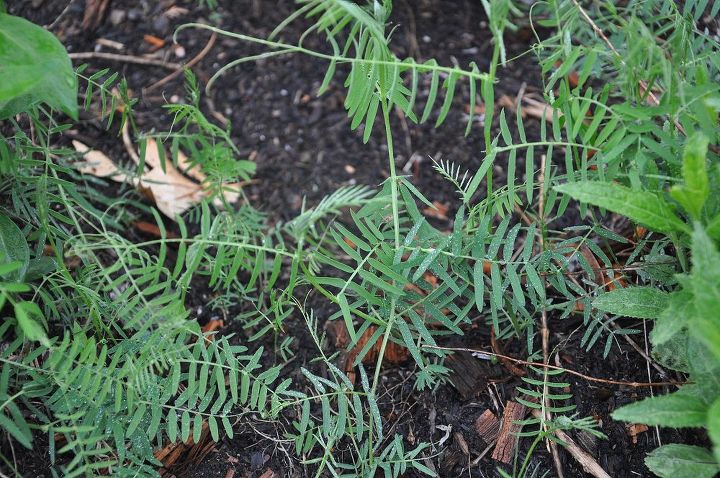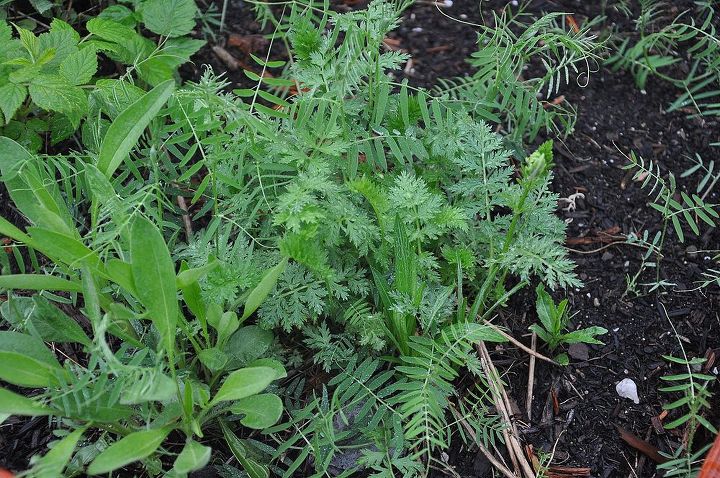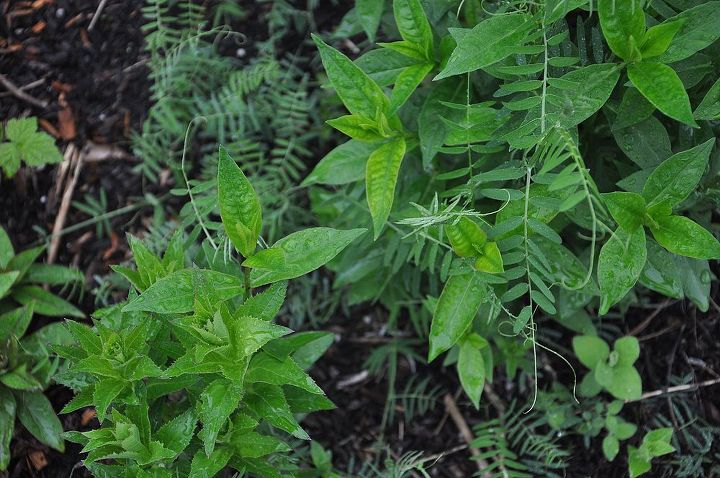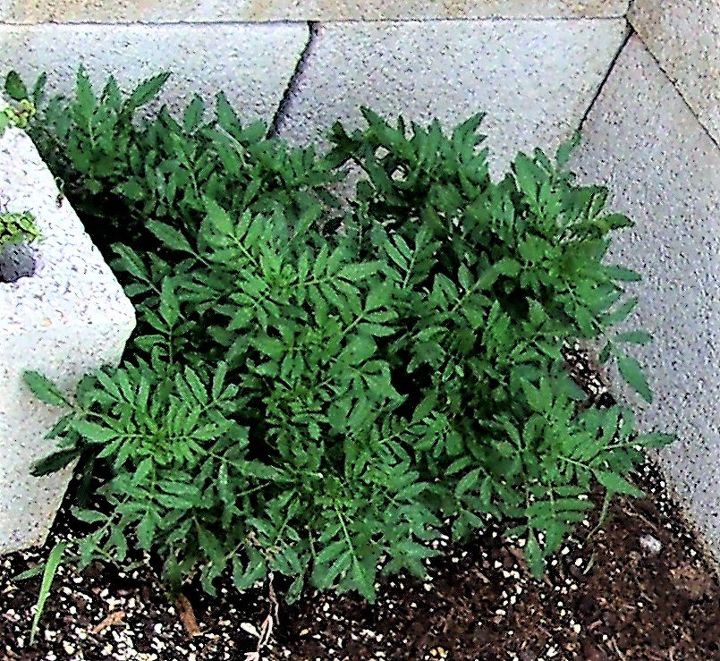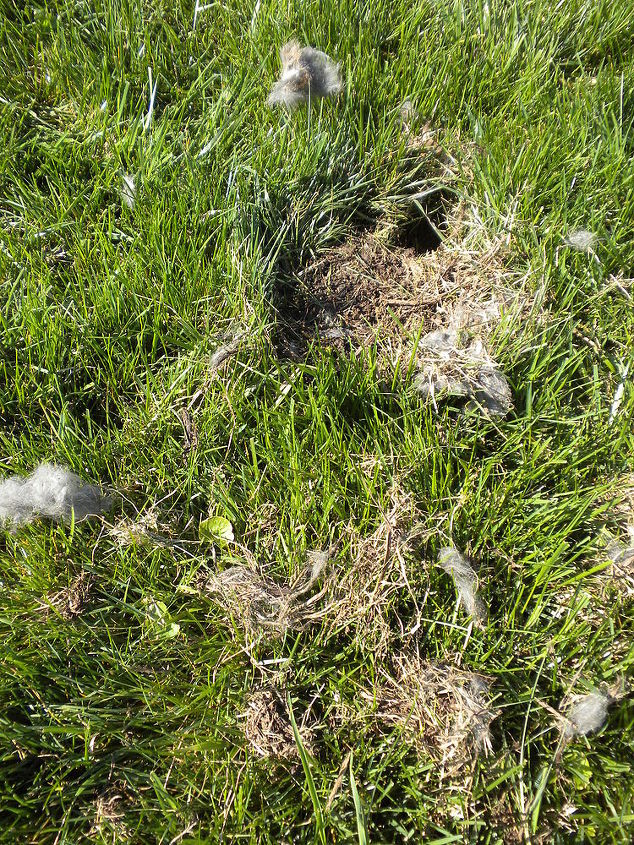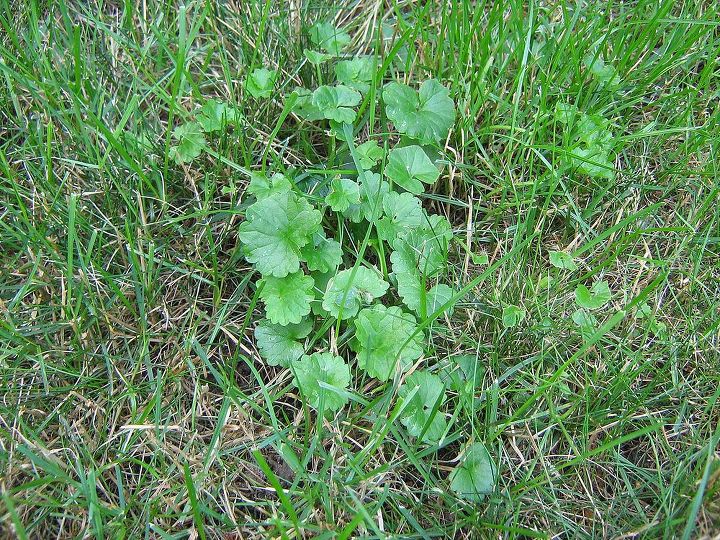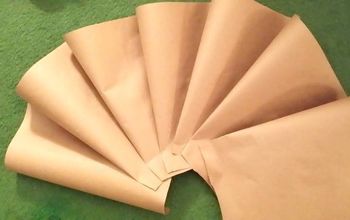Vetch

-
Kate, I have had this problem in a couple of beds, but have been able to control it by pulling it as it comes up. Not so lucky with a couple of other weeds that were taking over my perennial beds. What I found that controls it quite well is to dig out the perennials, remove the roots of the weed, then go full tllt at the garden by digging out the roots. I replanted the plants, then used round up when I noticed it coming up again. In the early spring, I have found the weeds come up first so I spray it again before the plants awaken. A lot less effort after the first round of weeding. Apparently there are also products available on the market that kill weeds but not flowers, just haven't been able to find them in Canada yet. Good luck and do let us know what works for you.
 Gail Salminen
on May 23, 2013
Helpful Reply
Gail Salminen
on May 23, 2013
Helpful Reply -
-
Thanks, Gail! I appreciate that and will try it ~ just can't dig up the huge butterfly bush but can go to town on the others ~ I'll look for the weed/not plant killer and check w/ Paul Parent who offers garden suggestions here in New England ~ perhaps you're familiar w/ him where you are. Thanks again and shall keep you posted!
 Kate Young
on May 23, 2013
Helpful Reply
Kate Young
on May 23, 2013
Helpful Reply -
-
Keep pulling, and pulling.
 Douglas Hunt
on May 24, 2013
Helpful Reply
Douglas Hunt
on May 24, 2013
Helpful Reply -
-
Pull it, then mulch with shredded paper, moisten the paper after it is in place and it will become like paper mache as it dries. This will form a barrier that will smother any roots that sprout. You will have to deal with sprouts that come up right at the base of your plants, but that's a lot less work than the entire bed. You can also put a decorative mulch over the paper if the white bothers you. I didn't and my son asked my why it snowed in only one corner of our yard!
 Alice Vick
on May 24, 2013
Helpful Reply
Alice Vick
on May 24, 2013
Helpful Reply -
-
Thanks Doug and Alice ~ Doug, that's what I've been pulling and it looks like i'm fighting a losing battle!! LOL but maybe a little snow-like look will be attractive w/ the color in my garden, Alice!
 Kate Young
on May 24, 2013
Helpful Reply
Kate Young
on May 24, 2013
Helpful Reply -
-
Pulling isn't going to do you any good. It propagates by it's roots, not seed, and will only keep returning. The only way to permanently getting rid of it is to spray your beds with a weed killer that is recommended for this type of plant, then covering the beds with a plastic for a few weeks. Don't water before or after until the vetch is gone. If you have plants that are removable, take them out and carefully remove all the vetch and soil from the plant. Plant them in fresh clean soil in a pot, until you are ready to put them back in the beds. If you bushes are bigger and can't be removed, water well the a day or two beforehand, carefully try to remove any vetch in the plant itself, then spray the weed killer around it up to the base of the plant, followed by laying plastic around the bush and cutting holes to let the bush out. It should not kill off your bushes, but you won't be able to water for at least a few days to a week, depending on how dry the bush is and how much water it usually takes. Then when watering only give as little water as possible and water only on the bushes or plants base. In a few weeks the vetch should be gone.
 Jill
on May 24, 2013
Helpful Reply
Jill
on May 24, 2013
Helpful Reply -
-
Thank you, Jill very much. I know it sounds like a lot of work but if it is successful, it's worth doing. I appreciate all the help and know I've got a big job ahead of me. This development is built where the old drive in was, not the best of soil, but many different kinds of weeds, vetch being the most troublesome! Thanks again!
 Kate Young
on May 24, 2013
Helpful Reply
Kate Young
on May 24, 2013
Helpful Reply -
-
The depressing thing is, like poison ivy, if there's a speck of root left, all is for naught. Be mindful when using a weed blocker such as the shredded paper (I use plain old cardboard boxes broken down) because it can also block rain water and your desired plants can suffer. Water carefully.
 Christine
on May 25, 2013
Helpful Reply
Christine
on May 25, 2013
Helpful Reply -
-
Thank you, Christine ~ I'll be careful ~ just tired of pulling and pulling ~ the roots proliferate the weed and it just gets worse. We've had so much rain that, yes, the plants grow, but so do the weeds, and the vetch is miserable to deal with. Will try a couple different things to get a jump on it if possible!!!
 Kate Young
on May 25, 2013
Helpful Reply
Kate Young
on May 25, 2013
Helpful Reply -
-
USE ROUNDUP. I SEE IT HAS ALREADY BEEN MENTIONED. SO GOOD LUCK!
 Jeannette Scott
on May 25, 2013
Helpful Reply
Jeannette Scott
on May 25, 2013
Helpful Reply -
-
Thanks, Jeannette, but won't that kill my butterfly bush? Some of the other plants I can pull and plant in pots for planting later, but they're so entangled now and don't want to kill what I've worked hard to grow and plant.
 Kate Young
on May 25, 2013
Helpful Reply
Kate Young
on May 25, 2013
Helpful Reply -
-
The best thing you can do it take out the smaller plants you want to save...making sure you do not get any roots of this junk...and plant them elsewhere for now...perhaps all summer. Then get some landscape cloth and lay it in the bed. Cut a gap for your butterfly plant, making sure none of the junk get out of the cut. then weigh it down with bricks and wait for it to die! Water can get in for your bush but the junk will die. Do not get in a hurry. Cover every little speck of this junk and then some, to make sure you get it all.
 Jeanette S
on May 25, 2013
Helpful Reply
Jeanette S
on May 25, 2013
Helpful Reply -
-
Kate, you are right, the round up will kill all other plants around it. What you can do is dig up a piece of vetch and check out the root system, then dig up you plant and remove all of the vetch roots. Pot in pots for a while and then spray the area with round up. You should be able to replant your plants in about four weeks. At least that Is what I remember from the instuctions, but read the intstructions. I worked for me in another garden with a different invasive weed. Now I just spray in the early spring before the plants emerge.
 Gail Salminen
on May 25, 2013
Helpful Reply
Gail Salminen
on May 25, 2013
Helpful Reply -
-
Spraying Round up will kill every thing, and if you use enough to kill that infestation you could have in your soil for weeks. Dig out all you can, spray a natural weed killer on the soil, cover with cardboard/paper which every one you have the most of and use a watering bottle at the roots of you larger plants you can't move. Vinegar, salt, and Dawn works well to spray it on the weeds as it comes up, this will kill the roots as well, but you have to spray just about every day. recipe 1 gal vinegar, 1/8 cup salt, 1/4 Dawn dish soap. mix and spray,
 Vanessa Godfrey
on May 25, 2013
Helpful Reply
Vanessa Godfrey
on May 25, 2013
Helpful Reply -
-
Well, thank you Gail, Jeanette, Vanessa ~ I'm going to put some of this together and try a variation ~ the vetch is growing out under my raised beds which are deep within the ground themselves, so know this evil weed is running deep. It's going to take me a bit, but somehow I'm going to try the vinegar recipe and replant the smaller ones, protect the butterfly bush as best I can and use landscaping cover ~ I hope a combination and perhaps I'll find a weed killer specifically aimed at VETCH ~ hate it!! Thank you all so much for your suggestions and help. I'll try to let you know what seems to work in the end ~ if this darned rain ever stops!!! Happy Memorial Day Weekend to all!
 Kate Young
on May 25, 2013
Helpful Reply
Kate Young
on May 25, 2013
Helpful Reply -
-
Roundup may be very bad for bees and come with a host of unknown problems, but it is a topical herbicide. It kills what it comes in contact with, not other plants.
 Douglas Hunt
on May 25, 2013
Helpful Reply
Douglas Hunt
on May 25, 2013
Helpful Reply -
-
Help answer this question... Hold on. Round-up is a non-selective herbicide. It works on leaves, in temperatures over 50 degrees. This means it doesn't choose between vetch and dandelions. It kills thru the photosynthesis process. It doesn't damage the soil. Vinegar, salt, baking soda, gasoline all damage the soil. Either its pH or just poisoning it. You don't have to dig everything up. That's a big waste of time and can kill the plant you intend to save. Plus, you'll have vetch roots in THAT dirt! You can spray Round-up around planted plants. A huge Japanese Maple, Crape Myrtle, Heuchera, Hosta, and many other collections, (Ok, some OCD in there.) so about 3 acres of specimen plants I don't want dead, but I have poison ivy, vetch, and all kinds of just plain crap loving my good garden beds. Every year I spray the ivy. (Different places 'cause birds poop out the seeds.) I do it on very still mornings, and shield desired plants with cardboard. I literally hold 1/2 a cardcardboard box around that which I"m protecting. As a matter of fact, I can't afford 3 acres of bed edging, so I spray an edge of Round-up all the way around every bed. It makes a spot where nothing is growing and I can run the mower along it. Anyway, If you read the back of the bottle, they conveniently list how to use the product. It kills aqua-life. Stay away from waters where frogs or other wonderful water things live. But all that "healthy" stuff such as vinegar? It KILLS indiscriminately. Plus, you can't plant in that dirt until the vinegar percolates out thru the dirt. Natural or not, glyphosate is gone with the first rain fall. Just be aware of where your run-off goes for amphibian life.
 Christine
on May 26, 2013
Helpful Reply
Christine
on May 26, 2013
Helpful Reply -
-
Thank you, Christine. I am happy with that answer and will try a small area first to see if I make some progress ~ if it works well, I'll move in for the big attack.
 Kate Young
on May 30, 2013
Helpful Reply
Kate Young
on May 30, 2013
Helpful Reply -
-
Just want to let everyone know that Christine's suggestion using the Round-Up was successful and did NOT harm the other plants as some of us were so quick to believe. I used a small amount and primarily aimed it where the vetch was coming up ~I pulled it some to get the main direction, then pump sprayed it ~ voila! So far, so good. Thank you all for your great suggestions and I do appreciate all your help!
 Kate Young
on Jun 26, 2013
Helpful Reply
Kate Young
on Jun 26, 2013
Helpful Reply -
Related Discussions
GNATS - How to get rid of them?
Somehow my house and garden got tiny gnats that killed my fuchsia plant and fly everywhere. I have tried ALL the Web recommendations - soap and oil dishes, sand in th... See more
Marigolds growing! Should I pinch the buds?
My marigold plants are growing. I heard that pinching the buds until Autumn will allow them to grow without killing the plant. Is this true?
What's the best flower/plant to grow in Texas?
I know that opinions vary, but what's your opinion?!I have great luck w Rosemary plants. Green all year long.
How to get rid of termites?
Suggestions on how to get rid of termites naturally are appreciated however if there is only a chemical solution for these pests please share as well. Thank you!
Can someone tell me what kind of animal this was in my yard?
I thought maybe a rabbit was burrowing in my yard, but it's almost dead center of my lawn (not a very smart rabbit). The hole is not very deep, and I replanted it onc... See more
Is Creeping Charlie in your lawn a good thing or a bad thing?
Is there a sure-fire way to get rid of Creeping Charley?
